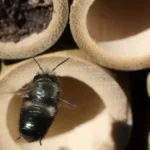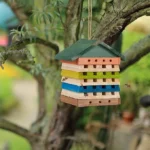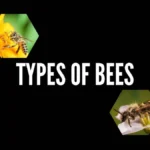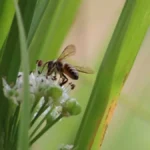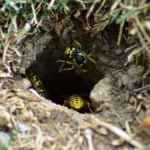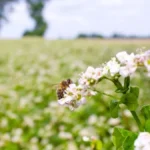Depending on where you are in the world, ground bees mean different things. Ground bees in Wisconsin refer to solitary bees that nest in clusters in the ground. These bees are of very little threat to anybody, and they serve an incredibly important pollination service. Read further to find out how you can live with these bees and even help them make your world a better place for you, and them.
Around the world, there are many different meanings for the word “Ground Bees”. These can be honeybees that nest in the ground in dry areas or stingless bees in the tropics. Ground bees in Wisconsin refer to a group of bees that nest in aggregations – in other words, these are solitary bees that nest closely together.
Ground Bees In Wisconsin
When we refer to ground bees in Wisconsin we are most likely referring to an aggregation of the miner and cellophane bees that have formed a nesting aggregation on a dirt slope.
Miner Bees
Bees such as the miner or chimney bees, Anthophora abrupta, form large aggregations of bees nesting in a sloped ground site. Sometimes these nests can persist for decades and can number in the thousands of bees. The females make nests that are tunnels with some mud work around them. The nests are packed with pollen, nectar, and eggs. These hatches produce 50% males and 50% females. Females mate, and then concentrate on making their nests.
Cellophane Bees
A second common ground bee that aggregates with miner bees is the cellphone bee. These belong to the Colletes genus.
If you want to try and identify bees in Wisconsin this guide helps you narrow down your target insects. The most likely species that you will find is the Unequal cellophane bee (Colletes inaequalis). Cellophane bees are named as such because they line their burrows with a waterproof bioplastic that helps them have a rather different way of rearing their young than other solitary bees.
The bioplastic is made by mixing the secretion of a special gland named after the French medical doctor and natural scientist who described the gland – Dr. Dufour. The Dufours gland secretes a substance that when mixed with the bee’s saliva forms a waterproof polymer. This polymer is then coated with an antifungal secretion. This allows the bee to do something very different from most other solitary bees.
If we look at bumblebees, carpenter bees, leafcutter bees, mason bees, and various other solitary bees they work on a similar principle. They make a ball of pollen and nectar and then lay an egg on or in this ball. Cellophane bees however have their bioplastic and their antifungal preparation. This means the bee can provision each site where she plans to lay an egg with far more nutritious liquid food. She lays the egg on the top of the cell – when the egg hatches, it falls into the liquid, grows, eats the food, and then pupates and metamorphoses into an adult bee.

Can Ground Bees Be Aggressive?
Solitary bees are by nature non-aggressive. They only really have stings to teach something that actually kills them a lesson. When a honey bee stings you it dies – and the queen bee in the hive continues laying eggs. When a solitary bee stings you, it dies – and then cannot lay any eggs. Hence the only time it makes sense for this bee to sting is if it actually really thinks it is going to die.
I would rate the risk of being stung by ground bees at about 0,001 if we compare them to honeybees at let us say 100. In other words, these bees just do not sting. They are peaceful. Very peaceful.
What Do Ground Bees Do?
These bees are very efficient local pollinators. Honeybees fly miles from their hives to find nectar – ground bees often will not fly more than a few hundred yards. This means that your ground bees are an incredible natural resource for pollinating things in your garden. Some species emerge really early in spring (when there is still snow on the ground in some cases) and are just amazing creatures.
Can Ground Bees Cause Damage?
They can cause a little bit of surface excavation to your soil – this is probably beneficial as it cycles soil around. Much like earthworms improve soil fertility by cycling soil I would imagine ground bees do the same. They are basically gentle harmless little creatures and generally, the damage they cause would be largely cosmetic to your ground surface. I would actually say they improve your garden!!
Why Do Ground Bee Nests Get Bigger Each Year and Then Suddenly Fade Away?
Ground bees have parasitic cuckoo bees that parasitize the nests. A cuckoo bee is a lazy parasitic bee that waits for a female bee of another species to provisional nest. The cuckoo bee then sneaks into the provisioned nest and lays an egg that will replace the mother’s egg, and that cuckoo bee will grow on the food that was intended for her larvae.
The number of cuckoo bees will consequently increase. Every cuckoo bee that emerges represents a ground bee that did not – as a result, the number of parasites grows and the number of ground bees declines.
Eventually, the ground bee aggregation site will become so parasitized that it will collapse in numbers and fade away. Some ground bees will have luckily moved off to other new aggregation sites and it will take a while for cuckoo bees to overrun these sites.
I hope this article has helped you understand more about ground bees in Wisconsin, and ground bee aggregation sites in general. If you have been blessed with a ground bee nest, enjoy these peaceful fuzzy little friends and take lots of pictures of them to share on social media! We need solitary bees to start taking their place on social media – they are beautiful special bees and deserve to be shared widely! As does this article – please share it!
Read more about: How To Get Rid Of Bee Nests In The Ground
Ground Bees FAQs
What are ground bees in Wisconsin?
Ground bees in Wisconsin are solitary bees, primarily miner and cellophane bees, that nest in the ground. They are non-aggressive and excellent pollinators.
Are ground bees in Wisconsin dangerous?
No, ground bees are very peaceful and rarely sting. Unlike honeybees, solitary ground bees will only sting as a last resort since stinging would be fatal to them.
What is the purpose of ground bees?
Ground bees play a vital role in pollination, especially in local ecosystems. They are efficient pollinators for gardens and crops within a short radius of their nests.
Do ground bees damage your lawn or garden?
Ground bees can create small soil mounds, but this is mostly cosmetic. In fact, their burrowing can help aerate the soil, promoting healthier plant growth.
What types of ground bees are found in Wisconsin?
The most common ground bees in Wisconsin are miner bees and cellophane bees. These bees often nest in large aggregations on sloped, dry soil.
Can ground bees’ nests grow in size each year?
Yes, ground bee nests can expand over time as more bees aggregate in the same area. However, the nests may shrink if parasitic cuckoo bees overrun the population.
Why do ground bee nests suddenly disappear?
Nests can decline due to parasitism by cuckoo bees, which lay their eggs in the ground bees’ nests, reducing the ground bee population over time.
How do cellophane bees protect their nests?
Cellophane bees secrete a waterproof bioplastic from their Dufours gland, which lines their nests, protecting their young from moisture and fungi.
How can I coexist with ground bees in my garden?
Ground bees are harmless and beneficial to your garden. You can leave them undisturbed and enjoy the pollination services they provide to plants and flowers.
When are ground bees most active?
Ground bees are typically active in early spring, even when there is still snow on the ground, providing critical early-season pollination for blooming plants.

Dr. Garth A. Cambray is a Canadian/South African entrepreneur and beekeeper with 28 years of experience in apiculture and specializes in adding value to honey. His Ph.D. research developed a new advanced continuous fermentation method for making mead that has resulted in a number of companies globally being able to access markets for mead. His company, Makana Meadery, exports honey mead to the USA where it is available to discerning connoisseurs. He has also developed technologies to commercially manufacture organic honey vinegar in Zambia for export globally. He holds a few patents globally in the ethanol industry and believes in technology and knowledge transfer for human development and environmental sustainability. One of his proudest achievements is the fact that the wind farm he started at one of his old apiary sites has essentially made his hometown carbon neutral.

